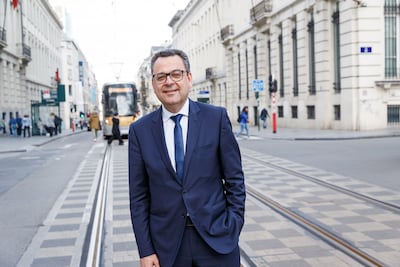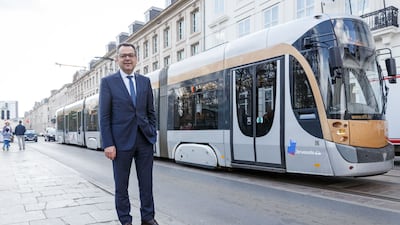Cities around the world are emerging from lockdowns into gridlocks as road traffic returns to pre-pandemic levels, according to the Secretary-General of UITP, the International Association of Public Transport, Mohamed Mezghani.
Without a revolution in mass transit, Mr Mezghani says that people will have to abandon hope of the quieter future glimpsed under coronavirus restrictions, when streetscapes were reclaimed for exercise, dining and enjoying urban environments.
He argues that a redefined public transport system in a “green alliance” with walking and cycling is the most efficient means of making the vision a reality, moving people instead of countless cars.
Yet most governments have failed to either financially support the sector devastated by drastically reduced demand since the spread of Covid-19, or decisively act to limit the use of cars.
“Public transport is experiencing a paradoxical situation: on the one hand, there’s a consensus on its essential role in providing mobility for all, but, on the other hand, most policymakers don’t see its benefits for society, the economy and the environment,” Mr Mezghani told The National.
“It’s like it has had to sustain itself while they generally support other sectors, such as the automotive industry or airline travel.”
His comments come as the motor giant Ford announced that its at-risk transmission factory in Halewood on Merseyside would be upgraded to make electric car parts with financial help — reportedly £30 million ($41m) — from the UK Government’s Automotive Transformation Fund.
Mr Mezghani said that simply adopting new technologies was not a panacea in the drive towards net zero emissions, painting a picture of carbon neutral regions heavily congested with electric vehicles.
It made little sense, he said, for governments to issue “rosy statements about 2050 and 1.5°”, while beleaguered public authorities and local transport operators faced with fewer passengers and fares were cutting services.
“Even having zero-emission cars will not solve the issue because a green traffic jam is still a traffic jam,” he said.
“Indeed, sustainability is not just about the environment but about making our cities more accessible, more inclusive, safer, healthier and prosperous.
“This is only possible if we opt for people-focused solutions — which is what public transport is all about.”
In the past, Mr Mezghani said, metro systems around the globe carried 168 million passengers a day, 14 times more than domestic and international airlines. Taking a bus consumed up to four times less fuel per passenger, compared with the average occupancy rate of 1.2 for a privately-owned single-use car journey.
“Public transport itself is the way to reduce energy consumption and greenhouse gas emissions,” he insisted, especially now that networks are doing their homework and emitting fewer pollutants and greenhouse gases.
Mr Mezghani, who recently called out the Manchester United football team for conveying a poor message to fans by taking a 10-minute flight to Leicester, will travel from Paris to the forthcoming Cop26 climate change conference in Glasgow by train.
Once there, UITP — a non-profit advocacy organisation for public transport authorities and operators, representing an international network of 1,800 member companies in more than 100 countries - will jointly host a high-level event with the International Union of Railways on board the HydroFLEX train.
Later in the day, Mr Mezghani and other stakeholders will discuss the ambitious mobilisation of sustainable transport for both climate change action and a resilient, just recovery.
With ridership at about 60 or 70 per cent of pre-Covid levels, he espouses a redefinition of mass transit to not only encourage more passengers back, but also to provide diverse solutions to changes in working habits and preferences for less-crowded vehicles.
Mr Mezghani said transport systems modelled on a concept called Mobility as a Service (MaaS) could become more flexible and give consumers what they want.
UITP defines it as a single digital mobility platform offering integrated planning, booking, payment and en route information across public transport, as well as shared bicycles, electric scooters, taxis and cars.
It would encompass the “last mile and first mile”, allowing people to purchase a travel pass for all the various modes to go from door-to-door, rather than station-to-station.
“In the past, we used to have this pass or monthly subscription, of which the value is calculated based on someone using public transport every weekday,” he said.
“Now, we have to admit that there's a large number of people who will only go back to the office two days a week or three days a week.
“So we need to offer them the possibility to use a bike with their pass, to use a scooter, to rent a car maybe during the weekend.”

Oversight should, Mr Mezghani said, be the remit of one agency, whether private, public, international or local, and regardless of which company or authority actually operates each mode of transport.
He likens the role to that of a tour operator co-ordinating flights, shuttle buses and hotel accommodation into one holiday package.
With convenient public transport that begins at the door, users could easily — for instance, via their smartphones — book a car that would arrive five minutes later to take them to a train station.
“That will make people change their behaviour. They will feel they don't need to own a car at all, because they know they can organise everything easily. So the convenience of using public transport is also very important — public transport and all those shared mobility modes.
“It should,” he says, “be as easy as ordering a pizza.”


